We are deeply saddened by the recent passing of our treasured friend and mentor,
Robert Gover, at the age of eighty-five.
Robert was the trailblazing author of nine novels—beginning in 1960 with the
racial satire and cult classic, One Hundred Dollar Misunderstanding, and
ending 49 years later with Two Brothers. He also wrote a collection of
short stories, Bring Me the Head of Rona Barrett, and, under the pen name
of O. Govi, a novella entitled Getting Pretty on the Table. Both were
published in the 1970s.
Early in his career, from 1952 to 1960, he worked as a journalist and later wrote
two nonfiction books: Voodoo Contra: Contradictory Meanings of the Word
(published by Samuel Weiser, June 1985) and Time and Money: The Economy and the
Planets (Hopewell Publications, 2011).
From 2008 through 2014, Robert served as an editor for Best New Writing.
The Gover Prize
was established in 2013 in his honor and awards an annual monetary prize plus
publication in the BNW anthology for best short fiction and creative nonfiction.
We offer this memorial edition of Serving House Journal to commemorate
Robert Gover’s sixty-plus years of service to the literary community.
• Duff Brenna:
I’ll always remember Robert with admiration and great affection. He was a
good friend and will be missed. It’s still hard to process that he’s
gone. Such a vital, full of life man. All roads converge in his wake.
(See also Lolita on Steroids, Brenna’s
review of Gover’s novel On the Run with Dick and Jane.)
• Thomas E. Kennedy, in
Remembering the Sixties:
I recall how welcoming Robert had been when I approached him about a dozen years
before and unashamedly identified myself as a long-term fan. I had never dreamed
when I read his novels in the ’60s and beyond that I would actually meet him.
Not only did I meet him but he was overwhelmingly generous in sharing his memories,
knowledge, and experience; his critical judgment; his support; and his
friendship.
• Christopher Klim:
Robert Gover was the father that I never had. ...[a] friend, burning light to
many of us, perhaps the last handhold on the spirit and passion of the 1960s....
All I can do is pour a drink in his honor and put on a Doors album. Godspeed Bob.
He’s Breaking on Through...
(See also Klim’s tribute:
Reconstructing a Radical Realist.)
• Lennox Raphael, in
Loneliness of the Long Distance Writer:
Memories are the bones & sinews of immortality as rumored compensation for
having lived to a ripe rage.... Bob, as I called him, was a dear*dear friend for
over 50 years.... I miss this member of the writing family, this clear mirror, and wish
his spirit safe passage to infinity beyond language and silence....
• See also the tributes in the Guest Book at www.legacy.com.
| One Hundred Dollar Misunderstanding |
The Maniac Responsible |
Here Goes Kitten |
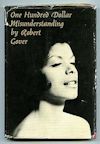 |
 |
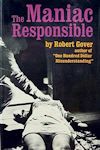 |

|
| Grove Press, 1962 |
Hopewell Publications, 2006 |
Grove Press, 1963 |
Grove Press, 1964 |
| |
| Poorboy at the Party |
JC Saves |
Going for Mr. Big |
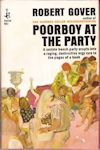 |
 |
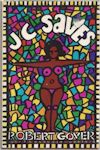 |
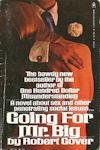
|
| Pocket Books, 1967 |
Hopewell Publications, 2012 |
Trident Press, 1968 |
Bantam, 1973 |
| |
| Getting Pretty on the Table |
Tomorrow Now Occurs Again |
Bring Me the Head of Rona Barrett |
Voodoo Contra |
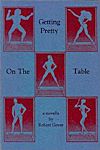 |
 |
 |

|
| Capra Press, 1975 |
Ross-Erikson, 1975 |
Michael Hargraves, 1981 |
Samuel Weiser, 1985 |
| |
| On the Run with Dick and Jane |
Two Brothers |
Time and Money: The Economy and the Planets (2nd ed.) |
Confessions of a Political Pornographer |
 |
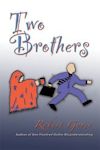 |
 |

|
| Hopewell Publications, 2006 |
Hopewell Publications, 2009 |
Hopewell Publications, 2011 |
To be determined |
| |
Robert Gover became a best-selling novelist at the age of thirty. His first novel,
One Hundred Dollar Misunderstanding, an irreverent satire on American racism,
remains a cult classic and was among the primary books exposing the sexual, racial,
and linguistic hypocrisy that governed the USA in the mid-20th century [from his
bio at Hopewell Publications].
The story, about an affluent white college sophomore’s relationship with a
black 14-year-old prostitute, was deemed “a gross violation of good taste”
by Gover’s agent at the time (1959-60). However, his agent’s partner
shopped the manuscript around. Although a dozen publishers in the United States
rejected it, the manuscript was picked up in 1961 by publishers first in France—where
it was released by La Table Ronde to great acclaim during the summer of 1962—and
then in England, where the novel was actually first released in 1961 by Neville
Spearman Publishers. (Publication in France had been delayed pending translation
of the manuscript.)
The novel’s first publication in the US was by Grove Press in October, 1962,
and only after Gover had finally agreed to change all instances of “fuck”
to “fug”—which, in the days before word processors and photocopiers,
was a time-consuming labor.
As he wrote years later, in an essay published here in SHJ (Fall 2010):
“It’s hard to imagine now, but this was a time when the word fuck,
in print, was viewed with the kind of gentrified alarm elicited by war refugees
today. This was a time when newspapers would carry stories of pederasty and bestiality
but ban trans-colorline sex as too awful to print.”
—From One Hundred
Dollar Misunderstanding: The Evolution of a “Foul, Iniquitous,
Atrocious, Horribly Wicked” Best-Seller
Gover dishes more details in his memoir, an excerpt of which appears in
World
Voices, an international chapbook series of prose and poetry edited by Walter
Cummins and Thomas E. Kennedy, and published online by Web del Sol.
As Thomas E. Kennedy says in his
introduction to the chapbook:
Gover’s memoir, Confessions of a Dissident Writer, a hefty part of
which is excerpted here, gives a glimpse from the inside of the heady life that
he found himself living, of roads taken and not taken (e.g., turning down an offer
to tour Europe with Jim Morrison and write a book about the experience), of successes
and defeats and the acquisition along the way of self-knowledge and understanding.
...Anyone interested in American literary, cultural, and social history of the mid-
to late twentieth century will find this an enthralling read.
In “Part 2: Busted,” from
Confessions of a Dissident
Writer: A Cautionary Tale, Gover recalls how he was paid a record advance for his novel
Poorboy at the Party. However, after Publishers Weekly featured the novel
on its cover in September 1966—practically guaranteeing the number one spot on bestseller
lists—Gover’s editor and trusted advisor Herb Alexander disappeared and publication
of Poorboy was sabotaged, apparently for ideological reasons.
Gover also describes encounters and exploits with Abbie Hoffman, Hunter S. Thompson,
and Jim Morrison. For example, in the parking lot of the Pussy Cat a’ Go Go
in Las Vegas on 29 January 1968, both Gover and Morrison were arrested and spent
several hours in jail. Morrison had taunted a security guard by pretending to smoke
a joint, and the guard responded by beating him bloody with a billy club. When
police arrived, they charged Morrison with public drunkenness, vagrancy, and failure
to possess sufficient identification; and they arrested Gover on principle since
he was also a “longhair.”
They handcuffed us and put us in the back seat and drove. Jim now got into a chant-like
rant, saying things like, “Hey Bob, ain’t these peckerwood rednecks
the most pathetic motherfuckers you ever saw?” And other such endearments.
One officer turned around and said to me, “You’d better shut your friend
up, or we’re gonna have a party after midnight when we get off duty. We’re
gonna take you guys to a cell where we can be alone.”
Hearing this threat only raised Jim’s rant a few decibels. I knew him well
enough by this point to realize that he had just enough wine in him to be entering
his death-defying zone. Not much anyone could do with him when he got into that
space. He was the only human being I’d ever met who showed no fear of death.
All break-through art demands a death-defying courage and Jim had it in spades.
Gover wrote an essay about the experience, “A Hell of a Way to Peddle
Poems,” which was published in Jim Morrison: An Hour for Magic, by
Frank Lisciandro (Plexus Publications; 3rd edition, September 1996).
(See related story
Jim Morrison Arrested with
Author Robert Gover at The Doors Examiner [updated 3 November 2016].)
In his chapbook at World Voices, Gover also describes quieter times:
When he came to dinner alone and it was just the three of us, we talked art, literature
and philosophy into the wee hours, and another aspect of Morrison emerged—this
one erudite and full of original ideas. Now and then he would recite a line or two
of his poetry, then smile at our reactions and say, “Maybe it will get into
a song.”
During one of those after-dinner discussions, we explored the question, “Who
really owns a work of art?” The artist? Naw. He or she is merely a conduit
for the work to come through. The buyer of the work? Naw. Art is an abstract essence,
not a tangible property that can be bought and sold. The public? Not really because
only a small minority really resonate with true art. Jim said this was why he really
loved being in music, that music is the most abstract and transcendent form of art.
He spoke of wanting The Doors’ performances to be as trance inducing as a
shaman’s ceremony—a concept unheard of back then. And he said he wanted
to make films that would be poems in visual form.
An expanded version of Gover’s chapbook appears as an essay in Issue Two of
Contemporary World Literature (6 November 2010), in which we discover among
other things what happened to Pocket Books editor Herb Alexander:
Confessions
of a Political Pornographer: A Cautionary Tale for Young Writers and
Editors
The memoir, which is yet to be published in book form, also describes Gover’s
upbringing, his struggles as a wannabe novelist, his success as a bestselling
author—and how he crashed from a net worth of over $1 million to homeless
and addicted, and then recovered with the support of his wife Carolyn and the help
of Alcoholics Anonymous.
• On the Run with Dick and Jane
This is another novel that prompts the puritan rightwing to hold its collective
nose. Why? Because it deals uncompromisingly with Sex Trafficking of underage girls.
Its main protagonist is a twelve-year-old named Jane Doyle who is in a North Carolina
orphanage called, ironically, “Grandmother’s Home.”
—From Duff Brenna’s review Lolita on Steroids
When this manuscript first came across our desks, it had been collecting dust in
the author’s drawer, virtually unseen by anyone for fifteen years. We were
immediately struck by the timeliness of the story, even though it was set in pre-cell
phone, pre-9/11 America, circa 1990. Gover writes with prophetic insight about
characters involved in the burgeoning American health care crisis, child abandonment,
and the child sex-slavery trade that moves silently over borders throughout the
world. We understood that this book was more relevant now than ever.
—Hopewell Publications
• Two Brothers:
...by turns a love story, an updated Prince and the Pauper, a thriller, and an
economic overview of a rocky American economy. A wonderful achievement.
—Michael Lee, Literary Editor of The Cape Cod Voice and member of the
National Book Critics Circle
• Time and Money: The Economy and the Planets:
Robert Gover’s challenging and fascinating new book is both massive in its scope
and startling in its vision. It truly offers something for everyone.
—FinancialCyclesWeekly.com
Gover’s experience as a social commentator makes Time and Money worth a
read, regardless of one’s views about astrology.
—Euromoney Magazine
• One Hundred Dollar Misunderstanding:
The book was hot stuff for us children of the Fifties.
—Bob Dylan, from an interview by Studs Terkel
In the early Sixties, this novel which mixed sex, race, and money shocked America. Now,
[50]-some years later, it still has readers turning pages.
—Writers World
In the late 1950’s, you couldn’t even curse in a novel. You had to dance
around sex, and you certainly couldn’t portray race relations in an honest light. How
in the world was a realistic story ever told? Along comes Robert Gover, an American whose
novel was exiled to Europe by the puritan values that would soon tumble. [This novel] makes
cartoon characters out of the stereotypes that dominated the races by sneaking them under the
cultural radar in the bodies of a young black prostitute and a rich white college kid. This
oil and water relationship has more in common than one might think. Before this quick and
engaging read is over, the genius becomes the fool, the chicken becomes the fox, and the
reader just might question his/her own assumptions.
—Hopewell Publications
Gover has written a “special” book, a freak of a novel; he has farced up the
race, sex, and money issues in American life by caricaturing two amorous antagonists in a
series of burlesque monologues, extended exercises of style.
—The New York Times
So exuberantly different from the common run of novels that the celebration should be loud
and long.
—Atlantic Monthly
What a find! I’ve been recommending it to everyone. This book should create a
sensation.
—Henry Miller, author of several novels which were banned in the United States, including
Tropic of Cancer (1934) and Tropic of Capricorn (1939)
[Robert Gover] has written a tragedy, for all of us; he reveals the emptiness and
banality of a bored society’s emotional responses, not to mention the poverty
of its dialogue. There is always a division between what a society does and what
it says it does, and what it feels about what it says and does. But nowhere is this
conflict more vividly revealed than in the American middle class’s attitude
toward sex, that continuing pleasure and sometimes duty we have, with the genius
of true pioneers, managed to tie in knots. Robert Gover unties no knots but he shows
them plain and I hope this book will be read by every adolescent in the country, which
is most of the population.
—Gore Vidal (1925–2012), novelist, essayist, playwright, and political
commentator, in
Comment, 1962 in Esquire